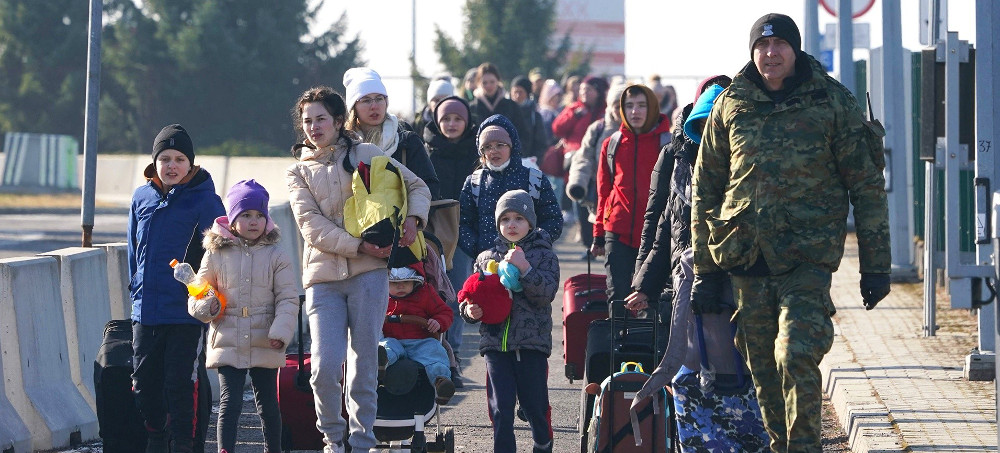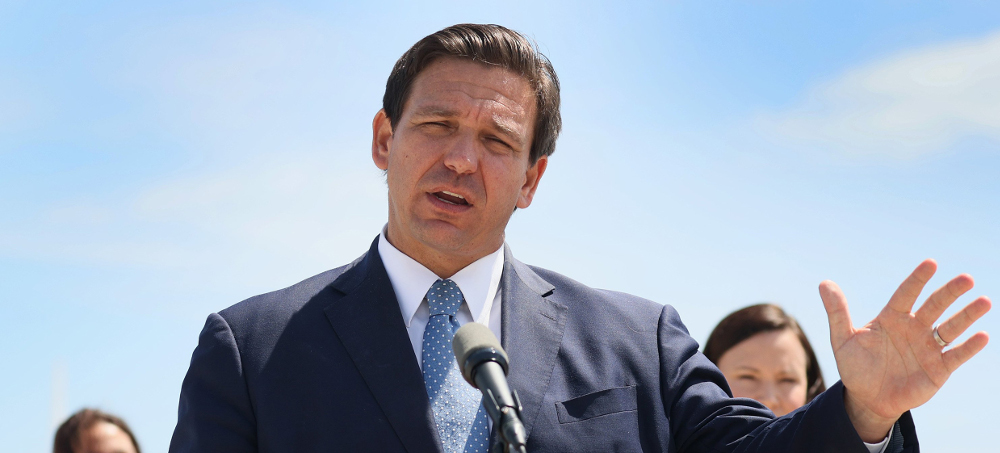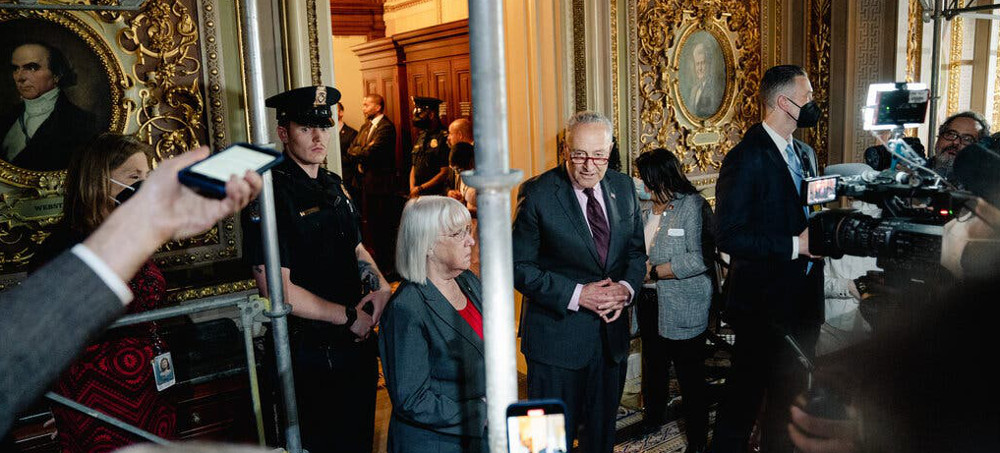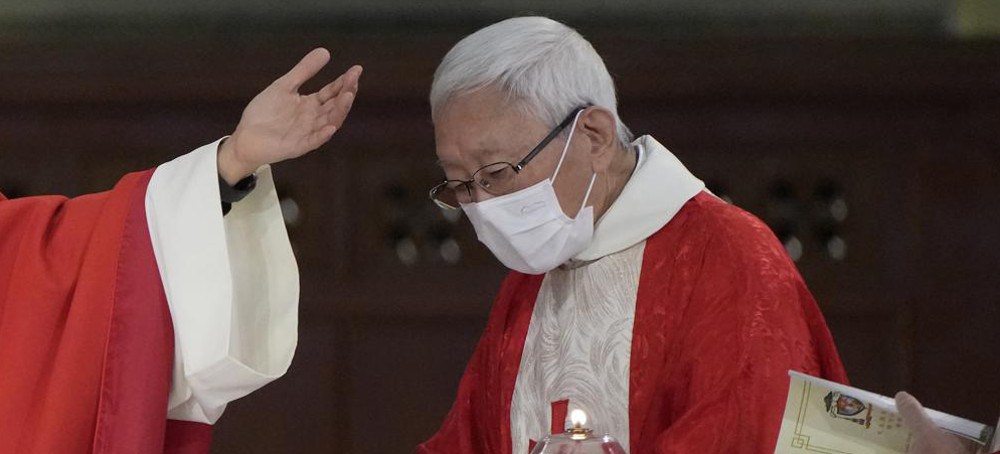Live on the homepage now!
Reader Supported News
In the richest country in the history of the world, it is absurd, to say the least, that we have sentenced an entire generation to a lifetime of debt simply for doing what was expected of them — getting a college education.
There are many thousands of young people who are graduating college with $50,000, $100,000, or more in debt and some of them, for financial reasons, weren't even able to finish their degree.
And if you go to graduate school or want to attend medical school, law school, or nursing school we’re talking about young people who have assumed up to $400,000 or even $500,000 worth of debt.
Further, sadly, hundreds of thousands of working-class high school students no longer see college as an option because of their fear of leaving school with massive debt.
It is time to hit the reset button.
There is $1.8 trillion in student debt owed by more than 46 million Americans — a number that has tripled since 2008, and the overwhelming majority of which is owed to the federal government.
I am urging President Biden to do the right thing.
To cancel it.
All of it.
Because here is the truth:
In the richest country in the history of the world, it is absurd, to say the least, that we have sentenced an entire generation to a lifetime of debt simply for doing what was expected of them — getting a college education.
In the richest country in the history of the world, it is a national disgrace that we lead the world in the amount of student debt owed by our people.
In the richest country in the history of the world, hundreds of thousands of young people should not be giving up their dreams because paying off their student loans is too expensive.
In the richest country in the history of the world, we should understand that investing in our young people’s education is investing in the future of our nation. It’s not only good for the individual student, but for our entire economy.
No, that is not what America is supposed to be about.
We have adopted a very warped sense of priorities when we can bail out Wall Street for their criminal activity that crashed the economy, but we can’t cancel student debt in this country.
We have adopted a warped sense of priorities when some of the wealthiest people and largest corporations in our country pay little or nothing in federal taxes, but we can't cancel student debt in this country.
We have adopted a very warped sense of priorities when we give billions of dollars to Jeff Bezos' space company, but we can’t cancel student debt in this country.
We have adopted a warped sense of priorities when we can always find enough money for war and the military — even more than President Biden asked for — but we can’t cancel student debt in this country.
So I believe it is time for President Biden to do the right thing.
It’s time for him to cancel student debt in this country.
Right now, the president is hearing from a lot of people on this issue. It’s important he hear from all of us as well.
Every day it becomes more obvious that having 46 million people drowning in $1.8 trillion of student debt is not sustainable.
The right thing to do for those people, and for our country, is to cancel it.
 An undated photo shows Shireen Abu Akleh, a journalist for Al Jazeera network. The well-known Palestinian reporter was shot and killed while covering an Israeli raid in the occupied West Bank town of Jenin early Wednesday, May 11, 2022. (photo: Al Jazeera)
An undated photo shows Shireen Abu Akleh, a journalist for Al Jazeera network. The well-known Palestinian reporter was shot and killed while covering an Israeli raid in the occupied West Bank town of Jenin early Wednesday, May 11, 2022. (photo: Al Jazeera)
Shireen Abu Akleh was a longtime reporter for the Quatar-based news organization
According to Al Jazeera, Shireen Abu Akleh — who was also an American citizen — was wearing a standard-issue protective press vest when she was shot in the back of the head while reporting in the town of Jenin. Her producer was also shot during the incident but survived, the Associated Press reported. While Israeli officials said Abu Akleh’s fatal injuries were possibly caused “by Palestinian armed gunfire,” the Palestinian Ministry of Health and another journalist wounded during the raid said the shots were fired by Israeli forces. “Al Jazeera Media Network condemns this heinous crime, which intends to only prevent the media from conducting their duty,” the news network said in a statement.
“She fell on the ground,” Shaza Hanaysheh, a Palestinian reporter, told the Associated Press. “The soldiers did not stop shooting even after she fell. Every time I extended my hand toward Shireen, the soldiers fired at us.”
Abu Akleh, 51, was a well-known reporter in the region who had worked for Al Jazeera’s Arabic language channel for over two decades. As news of her death spread, journalists from around the world paid tribute to Abu Akleh on social media, with many calling for increased protection for reporters in conflict zones. Washington D.C.-based Al Jazeera reporter Biesan Abu-Kwaik called her colleague “one of a kind,” while Nadi Abusaada, editor of the academic journal Arab Urbanism, said the reporter was “an icon for all of us who grew up watching her everyday on TV.”
Other journalists strongly condemned the circumstances that led to Abu Akleh’s death. “Shireen is an American citizen. Is that gonna make a difference?” asked journalist Dalia Hatuqa, noting that she doesn’t want Abu Akleh’s death to become “another statistic” of the ongoing conflict in the West Bank. “I want the U.S. administration to admit it has failed us as American citizens, that its weapons are killing us, that our lives don’t matter as long as the killers are an ‘ally.'” Mondoweiss‘ Palestinian News Director Yunma Patel called the shooting “an execution.”
Israel, meanwhile, condemned the attack and promised a thorough investigation into Abu Akleh’s death. “Journalists must be protected in conflict zones and we all have a responsibility to get to the truth,” Yair Lapid, Israel’s Minister of Foreign Affairs, said in a statement.
Wednesday’s incident was not the first time journalists have become caught in the crossfire while reporting in the West Bank. Almost one year ago, the Associated Press offices in Gaza were destroyed during an Israeli airstrike — an event the news agency called “shocking and horrifying.” In 2018, two Palestinian reporters died from gunshot wounds sustained during coverage of mass protests near the Israeli border. An Associated Press videographer was also shot in the leg, allegedly by Israeli forces, later that year — although Israel declined the news organization’s repeated requests to investigate the incident.
 Russian media stated that 1,106 children have been deported from Ukraine over the past 24 hours. (photo: AFP)
Russian media stated that 1,106 children have been deported from Ukraine over the past 24 hours. (photo: AFP)
Source: Russian media outlet TASS
Quote: "The head of the National Defence Management Centre of Russia, Colonel-General Mikhail Mizintsev, said that 8,787 people had been evacuated from dangerous areas of the Donetsk and Luhansk People's Republics and Ukraine over the past 24 hours without the participation of the Kyiv authorities. 1,106 of the evacuees are children."
Details: TASS also reports that a total of 1,208,225 people have been deported to Russia since the beginning of Russia's war in Ukraine. 210,224 of them are minors.
According to the Russian Ministry of Defence, 156,651 cars passed through the Russian border, including 1,887 cars over the past 24 hours.
Background: The Head of Donetsk Regional Military Administration, Pavlo Kyrylenko, stated that Russian aggressors had forcibly deported over 30,000 Mariupol residents to Russia.
 Blow to Ron DeSantis as judge says new congressional districts made it harder for Black voters to elect their preferred candidates. (photo: Joe Raedle/Getty)
Blow to Ron DeSantis as judge says new congressional districts made it harder for Black voters to elect their preferred candidates. (photo: Joe Raedle/Getty)
Blow to Ron DeSantis as judge says new congressional districts made it harder for Black voters to elect their preferred candidates
“I am finding the enacted map is unconstitutional because it diminishes African Americans’ ability to elect candidates of their choice,” circuit judge Layne Smith said on Wednesday, according to the Tributary. Lawyers for the state of Florida are expected to immediately appeal the ruling, and the Florida supreme court will probably ultimately decide the case.
The decision dealt specifically with DeSantis’s decision to dismantle Florida’s fifth congressional district. It stretched from Jacksonville to Tallahassee, was 46% Black, and is currently represented by Al Lawson, a Black Democrat. DeSantis’s new district chopped the district up into four districts where Republican candidates would be favored to win.
A coalition of civic action groups and Florida voters immediately challenged the map, saying that they violated a provision in Florida’s constitution that says new districts cannot “diminish” the ability of minority voters to elect the candidate of their choosing. In late April, the plaintiffs asked the court to block the districts in northern Florida specifically from taking effect for the 2022 election. Smith ordered the state to adopt a map that maintained a fifth congressional district stretching from Jacksonville to Tallahassee, according to the Tributary.
DeSantis has fumed against the current configuration of the fifth congressional district, saying considerations over race were too much of a factor when the district was drawn. Voting rights advocates say the district ensures Black voters in northern Florida do not have their votes diluted.
The Florida map is one of the most aggressively gerrymandered maps in the US. Republicans currently have a 16-11 advantage in the state’s congressional delegation, but DeSantis’s plan would add an additional four GOP-friendly seats, increasing that advantage to 20-8 (Florida is gaining an additional US House seat because of population growth). It’s an effort seen as a critical part of Republican efforts to retake control of the US House in the midterm elections.
DeSantis has also expressed skepticism about anti-gerrymandering language, including the anti-diminishment provision, in Florida’s constitution. He said in March that he believes courts could ultimately rule that the language, which also includes prohibitions against partisan gerrymandering, violate the US constitution’s 14th amendment, which guarantees equal protection under the law.
 Senator Chuck Schumer, the majority leader, was clear that short of passing legislation, he wanted to show Americans "where every single U.S. senator stands" on the issue. (photo: Shuran Huang/The New York Times)
Senator Chuck Schumer, the majority leader, was clear that short of passing legislation, he wanted to show Americans "where every single U.S. senator stands" on the issue. (photo: Shuran Huang/The New York Times)
Women’s Health Protection Act failed as expected, but Democrats say the move is about mobilizing voters, not passing legislation
Wednesday’s vote was 51 to 49 and well short of the 60 votes necessary under Senate rules. It was largely a reprise of a failed February vote staged by Senate Democratic leaders, but the issue has new resonance after last week’s leak of a draft opinion from Justice Samuel A. Alito Jr. suggesting that the high court is poised to overturn Roe and curtail guaranteed nationwide access to abortions.
All 50 Republicans and Sen. Joe Manchin III (D-W.Va.) opposed moving ahead on the bill. President Biden said in a statement afterward that the vote “runs counter to the will of the majority of American people” and that congressional Republicans, who cast the Democratic bill as a radical overreach, “have chosen to stand in the way of Americans’ rights to make the most personal decisions about their own bodies, families and lives.”
Senate Majority Leader Charles E. Schumer (N.Y.) and other Democrats have acknowledged that the move was about mobilizing voters, not passing legislation in a Congress where Democrats hold majorities but do not have the votes to defeat Republican filibusters or change the Senate rules to eliminate them.
“Elect more pro-choice Democrats if you want to protect a woman’s freedom and right to choose,” Schumer said after the vote. “Elect more MAGA Republicans if you want to see a nationwide ban on abortion, if you want to see doctors and women arrested, if you want to see no exceptions for rape or incest.”
Alexis McGill Johnson, president of Planned Parenthood Action Fund, said in a statement that the fight for abortion rights was at “a tipping point” and promised a nationwide campaign of voter engagement, starting with rallies Saturday in dozens of U.S. cities. “We will not back down, and we will not forget those who put politics over our health and rights,” she said.
But signs abounded this week that, despite displays of anger and pledges to take action, Democrats have yet to coalesce around a strategy to spark and sustain a public backlash capable of pushing abortion rights back to center stage in American political life and motivating voters to turn out for the November midterms — and beyond — to elect candidates willing to defend them.
The lack of a long-range plan of action has become especially conspicuous after the leak of the draft opinion, which represented the culmination of a nearly 50-year effort by conservatives to reverse Roe and pave the way for state efforts to severely restrict or prohibit abortion. The frustration was captured last week by California Gov. Gavin Newsom (D), who responded to the opinion by asking, “Where the hell’s my party? … Where’s the counteroffensive?”
In another internecine squabble, many Democrats responded to the draft opinion by calling on the Senate to again debate eliminating the filibuster — the 60-vote supermajority rule that allows a united minority to block most legislation — even though a January test vote on voting rights legislation showed that there is not enough support for it among Democratic senators.
A group of lawmakers has begun meeting to plan next steps on related measures, thinking about what the Democrats can advance via legislation or administration action. The effort is being led by Sen. Patty Murray (D-Wash.) and includes other female lawmakers in Democratic leadership: Sens. Debbie Stabenow (Mich.), Elizabeth Warren (Mass.), Catherine Cortez Masto (Nev.), Amy Klobuchar (Minn.) and Tammy Baldwin (Wis.), according to a Senate Democratic aide, who spoke on the condition of anonymity to describe internal discussions.
But interviews with lawmakers this week revealed clashing views over how best to highlight the looming threat to abortion over the coming months, including whether to hold votes on narrower bills that would protect only a portion of the rights secured by Roe and related cases but could serve to more sharply highlight the depth of the Republican opposition.
One such decision was to call up a bill Wednesday, the Women’s Health Protection Act, that is substantively identical to the legislation that failed in February rather than consider alternatives that could have won support from the Senate’s two Republican supporters of abortion rights, Susan Collins (Maine) and Lisa Murkowski (Alaska), or Manchin, who has campaigned as an abortion rights opponent but signaled Wednesday that he would be open to preserving the status quo.
Collins and Murkowski objected to a lack of religious freedom protections in the Democratic bill — a notion Democratic leaders contest — and no serious effort was made to address their concerns, senators and aides involved in the issue said.
However, party leaders agreed to drop some fact-finding language from the bill, softening some of its partisan edges. On Tuesday, one Democrat who previously had withheld public support for the bill, Sen. Robert P. Casey Jr. (Pa.), announced his backing. Manchin, however, did not, telling reporters Wednesday that the current bill “expands” abortion rather than preserving it.
The approach has perplexed Republicans, who have settled on a strategy of casting Democrats as the extremists and seeking to refocus attention on other issues on which the GOP thinks it is on more solid footing with the public, such as inflation and crime. In his daily floor speech Wednesday, Senate Minority Leader Mitch McConnell (R-Ky.) gave lengthy remarks panning Democratic policies “that fueled this runaway inflation” before turning his attention to the abortion rights bill, which he decried as “extreme and radical.”
“They’re not even attempting to nuance this at all,” Sen. John Thune (R-S.D.) said. “It’s all, you know, abortion up to the point of birth … which doesn’t even attempt to try and win over people who might be persuadable if they were a little less aggressive in their approach. They’ve decided they’re going full monty on this.”
The Democratic bill outlaws any limitation on abortion before fetal viability, while allowing abortions after viability “when, in the good-faith medical judgment of the treating health care provider, continuation of the pregnancy would pose a risk to the pregnant patient’s life or health.”
Many Democratic lawmakers said Wednesday’s vote should be the first of many, arguing that House and Senate votes on even partial protections that have no chance of becoming law are a reliable way to focus public attention on abortion issues over the next six months before voters cast their midterm ballots. Before the vote, dozens of House Democratic women marched across the Capitol chanting “My body, my decision.”
“This will be in the papers all over the country. It’ll be on the nightly news. It’ll be on talk radio,” said Rep. Cheri Bustos (D-Ill.), a former chair of the Democratic Congressional Campaign Committee. “I think of the old saying: It’s important to be caught trying, and we’re going to try really hard to do everything we can to highlight this.”
Some others, however, said they were not inclined to water down their efforts — at least not at first.
“Let’s start with the bill that fully protects women who need access to abortion,” Warren said Tuesday. “Starting by chopping down on that is the wrong direction. Women deserve full citizenship, full liberty, and our bill tomorrow will provide exactly that.”
Warren said she favored highlighting access to medication abortion, which comes as a spate of Republican-led states have pushed to place restrictions on prescribing and shipping the pills. She said a Senate vote was one option, which would be just as likely to fail as Wednesday’s measure, but she also suggested that executive actions from President Biden could be more appealing.
“Votes are an important part of it, but it will not be the only actions that we should be focused on,” she said, noting the Food and Drug Administration’s authority over medication abortions: “Right now, the rules are too restrictive. Women need better access, so there’ll be lots of things we’ll be talking about over the next six months.”
Holding votes on even narrower guarantees of abortion rights is also under consideration, several Democrats said — such as measures guaranteeing access to abortion in cases of rape or incest or in cases where the health of the mother is at risk. But many said they were wary of moving in that direction before the Supreme Court issues its final ruling, and some acknowledged privately that holding “show votes” on narrower bills could actually benefit Republicans by allowing some senators to distance themselves from the GOP’s most conservative elements.
Sen. Richard Blumenthal (D-Conn.), the lead author of the Democratic abortion rights bill, said he would be “very surprised” if Alito’s opinion — which holds that the Constitution “makes no reference to abortion, and no such right is implicitly protected by any constitutional provision” — is ultimately adopted by the court.
“It is so strident, so brash and unjudicial that I would be surprised if any court, let alone the United States Supreme Court, issues this decision without softening the edges and modifying the extremist language,” he said. “But the result will be the same. The result is radical and extreme, and we need to keep pushing that result.”
One option that Blumenthal and some other Democrats are floating is to hold votes protecting other rights besides abortion that have been secured by Supreme Court decisions rooted in the same legal theory as Roe — rights that are not enumerated in the Constitution but have been inferred from the due process clause of the 14th Amendment. Those include, among other things, the right to contraception and same-sex marriage.
“I can’t tell you right now all the different ways that we should be highlighting what a danger this poses for other rights that are based on the right to privacy,” Sen. Mazie Hirono (D-Hawaii) said. “There’s an entire range of issues, constitutional protections that will, I think, be in jeopardy.”
House Majority Leader Steny H. Hoyer (D-Md.) told reporters Wednesday “there may well be additional legislation we need to pursue,” citing in particular the potential threat to contraceptive rights. But he said any such decision would not be made until the high court rules.
The legislative strategy on Capitol Hill is being hashed out in tandem with a broader strategy on how to harness grass-roots distress at the looming threat to Roe. Planned Parenthood and its action arm reported a tenfold increase in people signing up to volunteer for mobilization efforts less than 24 hours after Politico first published Alito’s draft opinion. NARAL Pro-Choice America, an abortion rights group, netted its largest amount in a single day, garnering a 1,403 percent increase in donations compared with the day before the leak.
Scores of lawmakers and some abortion rights groups, including NARAL, have pushed for eliminating the filibuster to codify Roe. NARAL President Mini Timmaraju said in a statement that her group “supports passing the Women’s Health Protection Act by any means necessary, including ending the filibuster,” while 114 House Democrats signed a letter Monday pushing Schumer to do the same.
But the mathematics of the 50-50 Senate — as well as a rising recognition among Democrats that the filibuster is preventing a future Republican majority from passing nationwide abortion restrictions just as much as it is preventing Democrats from passing nationwide abortion protections — has dampened enthusiasm for any such fight.
Sen. Richard J. Durbin (Ill.), the top Democratic vote counter, said there has been “no serious discussion” about whether to eliminate the filibuster after Wednesday’s developments. And Sen. Angus King (I-Maine), who publicly advocated this year for ditching the filibuster to pass voting rights legislation, said Tuesday that he was not convinced it should be jettisoned under the current circumstances.
“Today’s annoying obstruction is tomorrow’s priceless shield, and we’ve got to think about it that way,” King said, raising the prospect of a national abortion ban. “We’ve got to think more than a month or two weeks ahead.”
 Retired archbishop of Hong Kong Joseph Zen, attends the episcopal ordination ceremony of Bishop Stephen Chow, in Hong Kong, Saturday, Dec. 4, 2021. (photo: Kin Cheung/AP)
Retired archbishop of Hong Kong Joseph Zen, attends the episcopal ordination ceremony of Bishop Stephen Chow, in Hong Kong, Saturday, Dec. 4, 2021. (photo: Kin Cheung/AP)
ALSO SEE: Arrested Hong Kong Cardinal a Fiery Critic of Beijing
“If you talk to any number of Catholics in Hong Kong, it’s not also particularly very surprising,” he told Sky News host Andrew Bolt.
He said the local authorities had been expected “to take some kind of action against Cardinal Zen for some time now”.
“Communist party-controlled newspapers in Hong Kong have been running fiery denunciations of the Cardinal, very pointedly laying him side by side with other jailed journalists and pro-democracy activists in the area,” he said.
“So, all the signs had been that this had been on their minds for some time.”
 People walk along an arm of the Parana River, where water levels reached historic lows, near Rosario, Santa Fe, Argentina, on Aug. 22, 2021. (photo: Juan Mabromata/Getty)
People walk along an arm of the Parana River, where water levels reached historic lows, near Rosario, Santa Fe, Argentina, on Aug. 22, 2021. (photo: Juan Mabromata/Getty)
The probability of the planet surpassing 1.5 degrees Celsius of warming in one of the next five years has grown to 50 percent, up from 20 percent in 2020 and 40 percent last year, reported The Guardian. In 2015, there was no predicted likelihood of that occurring. That year, the average global temperature first reached one degree Celsius above levels measured in the mid-19th century, BBC News reported. Last year, the average global temperature was 1.1 degrees Celsius higher than temperatures recorded between 1850 and 1900.
“The 1.5C figure is not some random statistic. It is rather an indicator of the point at which climate impacts will become increasingly harmful for people and indeed the entire planet,” said professor Petteri Taalas, who is head of the World Meteorological Organization, which published the new report, as reported by The Guardian.
There is also a 93 percent chance that by 2026 the record set in 2016 for the hottest year ever recorded will be surpassed.
“For as long as we continue to emit greenhouse gases, temperatures will continue to rise,” said Taalas, as BBC News reported. “And alongside that, our oceans will continue to become warmer and more acidic, sea ice and glaciers will continue to melt, sea level will continue to rise and our weather will become more extreme.”
As the climate crisis continues to worsen, the average temperature over the next five years will also almost definitely be higher than the previous five years.
“A single year of exceedance above 1.5C does not mean we have breached the iconic threshold of the Paris Agreement, but it does reveal that we are edging ever closer to a situation where 1.5C could be exceeded for an extended period,” said leader of the report Dr. Leon Hermanson of the UK’s Met Office, as reported by France 24.
Over the next five years, the effects of global warming will likely affect the Arctic region more than the rest of the planet, the scientists said, as BBC News reported. Temperature differences from the historical average will be three times greater there.
“Arctic warming is disproportionately high and what happens in the Arctic affects all of us,” Tallas said, as reported by France 24.
The precipitation forecast for this year is also worrying, as conditions are predicted to be drier for southwestern Europe and North America, while Australia, northern Europe, northeastern Brazil and the Sahel region of Africa are expected to see wetter conditions.
“The possibility of surpassing the 1.5C threshold, even if only for a year, is worrying,” said the University of Melbourne’s Dr. Andrew King, as The Guardian reported. “Our greenhouse gas emissions are still at near-record highs and until we get emissions down to net zero we’re going to continue to see global warming. Rapid and drastic emissions reductions are needed urgently.”
Special Coverage: Ukraine, A Historic Resistance
READ MORE
Follow us on facebook and twitter!
PO Box 2043 / Citrus Heights, CA 95611


No comments:
Post a Comment
Note: Only a member of this blog may post a comment.